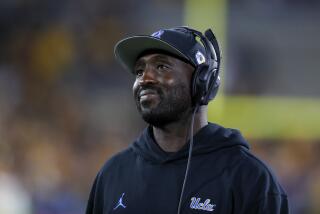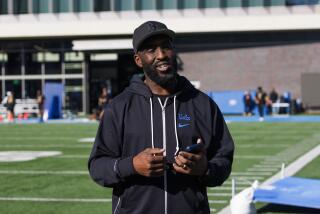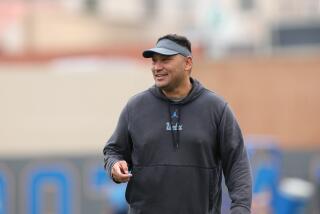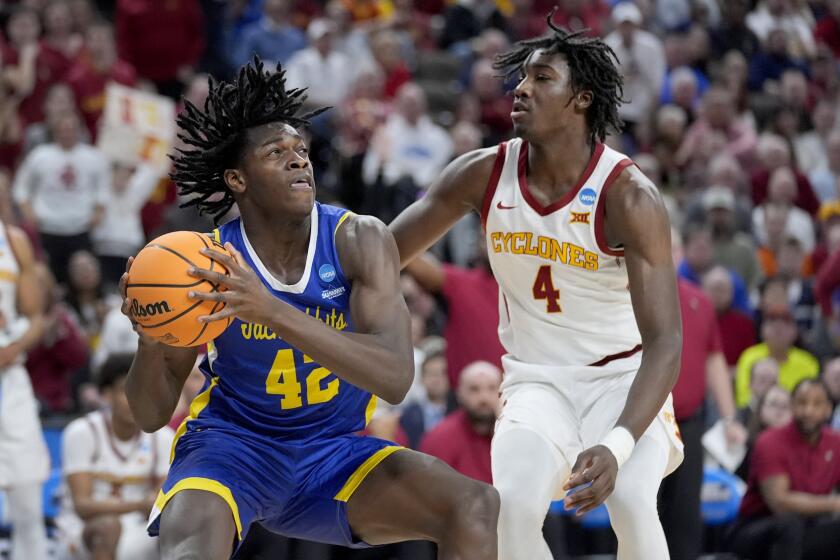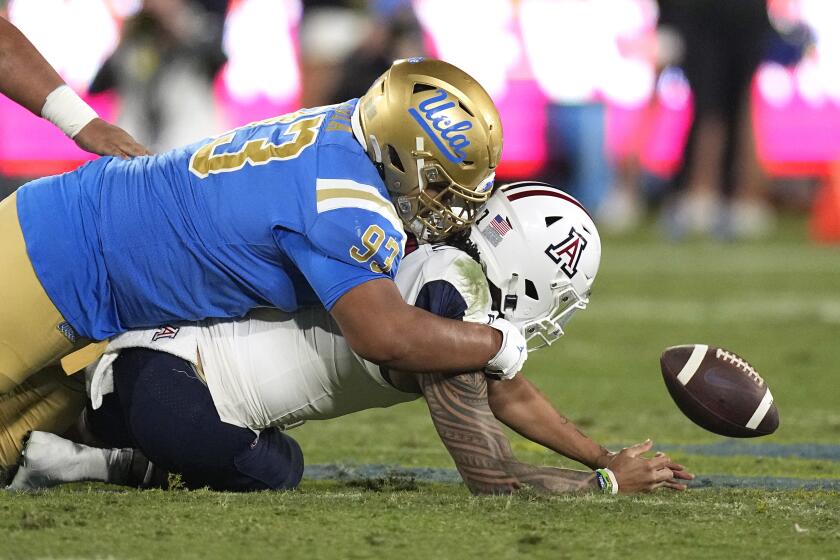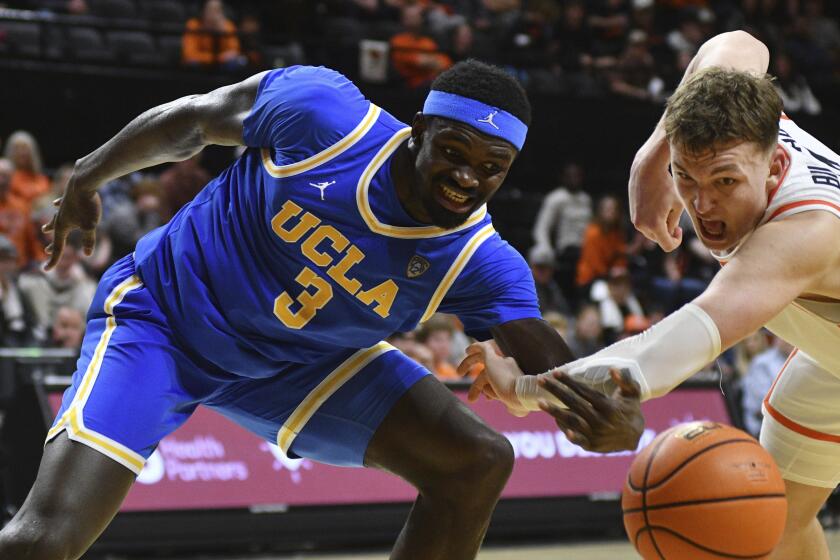In this case, Bruins want to actually snap
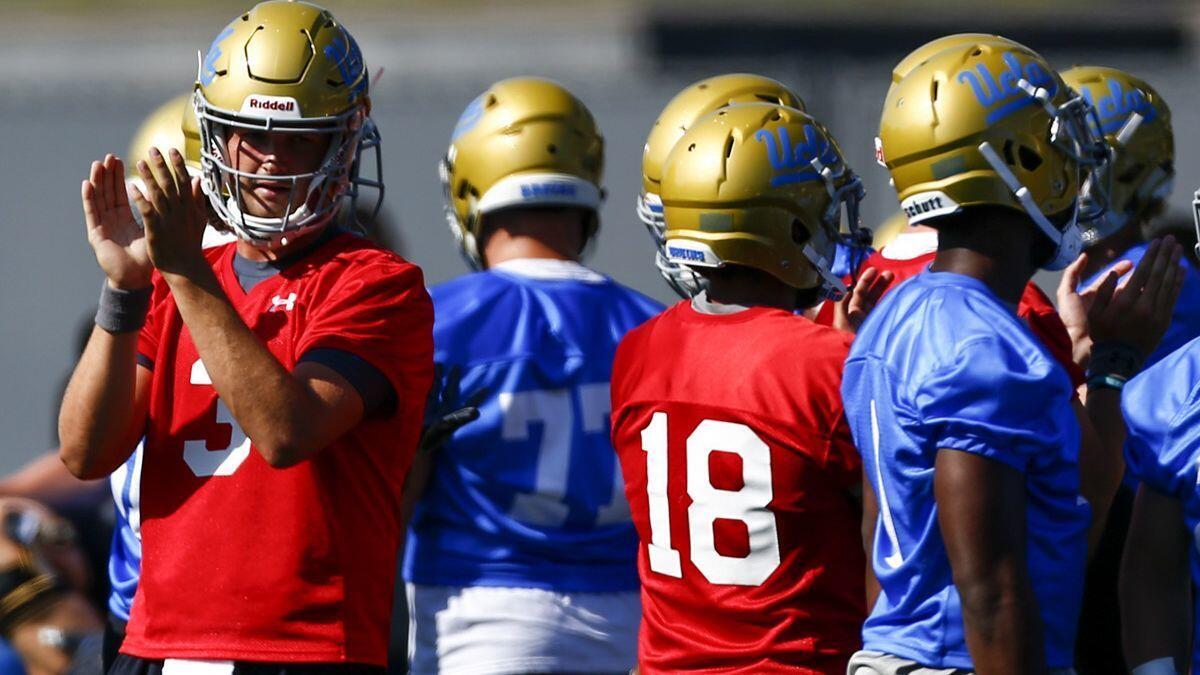
Nearly two weeks into training camp, UCLA’s struggles don’t so much involve learning the nuances of a complex offense as they do mastering one of the most fundamental motions in football.
Hut, hut, yikes?
“We’re having trouble snapping right now,” guard Michael Alves said Tuesday. “We just, we’re trying to get a consistent snap down. It’s really hard when you’re learning the offense, too, and technique at the same time.”
Fortunately for the Bruins, reinforcements have arrived. Offensive line coach Justin Frye has asked the guards to also learn center, as evidenced by the slew of linemen hiking the ball during practice.
Alves said he and freshman center Chris Murray have displayed consistency with their technique, though he remained confident that their fellow linemen could make the needed improvements before the season opener against Cincinnati on Sept. 1.
“I’m sure we’ll get it fixed pretty quickly,” Alves said.
UCLA’s offensive line has been in constant flux, with tackles playing guard and guards playing center in an effort to build depth and versatility. Their ranks were bolstered by the arrival of graduate transfer Justin Murphy, who appears completely recovered from the knee injuries that forced him to medically retire in 2016.
Murphy has added more than a veteran presence.
Said Alves: “He came in the first day and was already putting people on the ground.
Said guard-tackle Jake Burton: “He definitely adds a nastiness component.”
The linemen may need that sort of viciousness as they try to help revive a running game that has ranked among the worst in the nation the last two seasons.
“To come in here and not be able to run the ball really hurts me as an o-lineman,” Alves said. “So I think a big thing for us is trying to run the ball. And that comes with aggression, it comes with a mentality in our offensive line room of wanting to put the guy in front of us on the ground. So it’s a big weight on our shoulders, and I think our guys will handle it.”
Yellow submarined
Chip Kelly’s Oregon teams had one striking similarity to the Bruins in recent years under former coach Jim Mora: They were among the most penalized in the nation.
During Kelly’s final season with the Ducks, in 2012, they ranked No. 113 nationally with 68.2 penalty yards per game. In the three preceding seasons they ranked No. 103, No. 105 and No. 96, respectively.
Kelly noted that the Pac-12 Conference was the most-penalized conference in the nation during that span and that the Ducks usually weren’t last in the conference in penalty yards, with the exception of 2010.
Kelly said he emphasized avoiding penalties with the Bruins even though his Ducks won big amid a flurry of flags.
“I mean, any time you have a negative yardage play, whether it be by a mistake because you had a mental issue or you have a penalty, then those aren’t successful for you,” Kelly said. “So I’ve never been a guy that [said] penalties aren’t important; penalties are extremely important.”
Feeling fine
There was an additional player wearing a yellow jersey Tuesday, which qualified as newsworthy.
The Bruins have avoided widespread injuries through the first 10 days of training camp, only a handful of players wearing the yellow jerseys to designate that they’re off-limits from contact.
Offensive lineman Sam Marrazzo joined defensive linemen Atonio Mafi and Otito Ogbonnia, receiver Audie Omotosho and defensive back Colin Samuel in yellow Tuesday during the portion of practice that reporters were allowed to observe. Running back Bolu Olorunfunmi was also absent for unspecified reasons.
Kelly said he was pleased with his strength and conditioning staff’s proactive approach toward injury prevention.
“Part of that is still learning the individuals’ bodies and are there any imbalances and can they take care of those imbalances and put them to a point where they’re not susceptible to something?” Kelly said. “They’ve done a really nice job of identifying that.”
Follow Ben Bolch on Twitter @latbbolch
More to Read
Go beyond the scoreboard
Get the latest on L.A.'s teams in the daily Sports Report newsletter.
You may occasionally receive promotional content from the Los Angeles Times.

